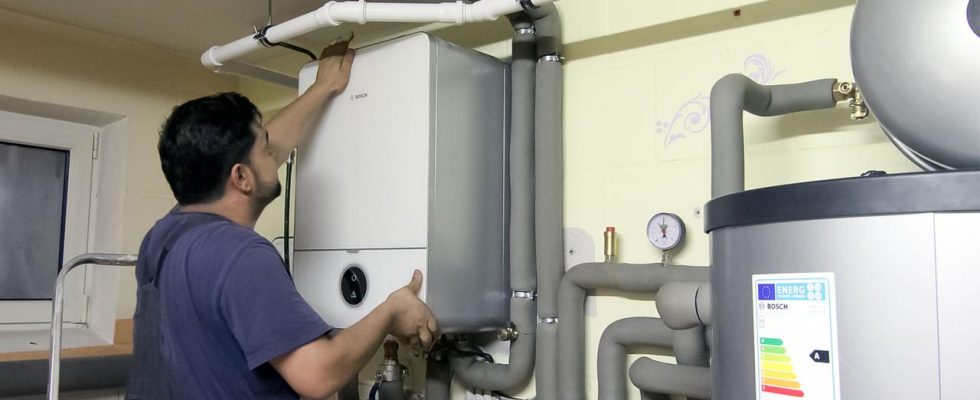faq
It was unclear for a long time what state support would look like when switching to a new climate-friendly heating system in 2024. tagesschau.de with the most important answers to the new heating law.
The Bundestag and Bundesrat had already passed the new Building Energy Act – often referred to as the Heating Act – in September. It comes into force on January 1, 2024. At the same time, an update to the funding guidelines was announced – but this was a long time coming. It is now clear: the new heating subsidies will also apply as planned from January 1, 2024.
What is the most important innovation?
Owners who use their house themselves can now receive a so-called speed bonus under certain conditions. There is also an income bonus for low-income households. This is intended to accelerate the switch to climate-friendly heating and to better take social hardship into account, as the guideline states tagesschau.de is present.
Which funding rates specifically apply?
There is a basic subsidy of 30 percent of the investment costs for replacing old, fossil heating systems with new heating systems based on renewable energies in existing buildings. These include heat pumps, solar thermal systems or biomass heating systems. This basic funding is open to private homeowners, landlords, companies, non-profit organizations and municipalities.
For heat pumps that use water, soil or wastewater as a heat source or use a natural refrigerant, there is an additional efficiency bonus of five percent. A surcharge of 2,500 euros is granted for biomass heating systems if they comply with a certain dust emission limit.
There is also an income bonus amounting to 30 percent of the investment costs. This is available to self-occupying homeowners with a taxable annual household income of up to 40,000 euros.
There is also a speed bonus amounting to 20 percent of the investment costs – as an incentive for retrofitting as early as possible. According to the Ministry of Economic Affairs, the “Speed Bonus” is granted for the replacement of functional oil, coal, gas or night storage heaters as well as biomass and gas heaters that are more than twenty years old. From 2029 onwards, this bonus is to be reduced by three percentage points every two years. The bonus will no longer apply from January 1, 2037.
Has anything changed compared to the announcements in September?
Yes. After the construction summit, the plan was actually to increase the “speed bonus” to 25 percent in 2024 and 2025 and, on the other hand, to extend it to housing companies and landlords. But this is not possible for cost reasons. After the Federal Constitutional Court’s budget ruling, the federal government has to plug billions in holes.
How much of the cost of replacing the heating system will ultimately be subsidized?
The bonuses should be able to be combined, but only up to a maximum funding rate of 70 percent. The maximum eligible investment costs for replacing the heating system are 30,000 euros for a single-family home or the first residential unit in an apartment building. In this case, the maximum amount of state subsidy is 21,000 euros.
For the second to sixth residential units there is an upper limit of 15,000 euros each, and from the seventh onwards it is 8,000 euros each. In an apartment building, the eligible costs increase by 15,000 euros for the second to sixth residential unit and by 8,000 euros for the seventh residential unit and above. According to the Ministry of Economic Affairs, for non-residential buildings there are limits to the eligible costs based on the number of square meters.
What is new is that the maximum limits of eligible costs for heating replacement and for efficiency measures can be linked. In total, a maximum limit of eligible costs of 90,000 euros per calendar year applies to a single-family home if there is an individual renovation schedule. According to the ministry, the maximum eligible expenditure for all measures carried out on the building was previously 60,000 euros within a calendar year.
Can you still apply for cheap loans?
Yes, the offer of low-interest loans with repayment subsidies for complete renovations at efficiency house level remains. Also new is a loan of up to 120,000 euros per residential unit – with reduced interest rates for private owner-occupiers of residential buildings with a taxable household annual income of up to 90,000 euros – for heating replacement and other efficiency measures.
Where and when can funding be applied for?
Instead of applying to the Federal Office of Economics and Export Control (BAFA), subsidies for heating replacement will in future have to be applied for from the state development bank KfW. Applications for funding are possible from the end of February – also retroactively for projects that have already been started.
According to the ministry, the heating replacement can be ordered after the guidelines have been published in the Federal Gazette and the funding application can be submitted later. The prerequisite is that the conditions of the funding guidelines are adhered to. This transitional regulation applies to projects that are started by August 31, 2024. The application must then be submitted by November 30, 2024.
The technical application for heating funding from KfW for private owner-occupiers in single-family homes is expected to be possible from February 27, 2024.
According to the ministry, according to the transitional regulation, a completed delivery or service contract with a specialist company must be submitted when applying for heating subsidies and other efficiency measures.
With information from Till Bücker, ARD financial editorial team

